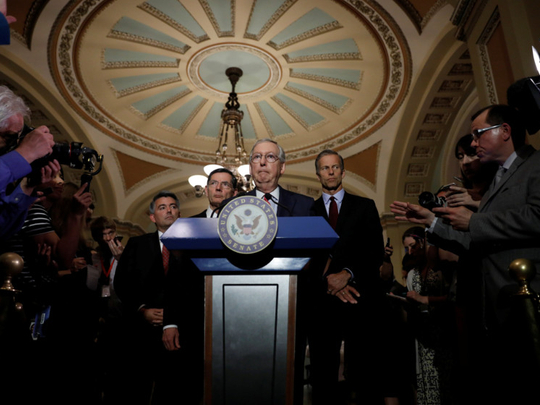
Now that Robert Mueller has been named special counsel, we can expect congressional Republicans to attempt a return to business as usual. Of course, that’s all relative: President Donald Trump will presumably continue to issue Twitter attacks on the investigation, leaks about his behaviour are likely to continue and the topic of obstruction of justice will still occupy many blocks of cable programming.
Still, you could almost hear the sigh of relief coming from Speaker Paul Ryan’s office. The pressure is off Congress to bear down on Trump, allowing the Republicans to bear down on cutting taxes and gutting Obamacare. It might even be easier this time, with Trump distracted.
But they may soon find themselves wishing for the good old days of pure presidential chaos. They’re about to learn just how ill conceived and unpopular the Republican legislative agenda really is.
Four major items loom: taxes, health care, the budget and an infrastructure bill that the administration will reportedly be sending up to Congress soon. Elaine Chao, the transportation secretary, said recently that the “principles” guiding the administration’s $1 trillion (Dh3.67 trillion) plan will be made public by the end of May.
Chao told a Senate committee that the plan would include $200 billion in direct federal spending. That might get Democrats on board. Republicans should hate that kind of spending. They gave the back of their hand to Barack Obama’s infrastructure bank, which started out at a mere $60 billion in federal spending. But now that Obama is no longer around to cut any ribbons or claim (rightful) credit for any jobs created, they’ll be much more amenable to doing a little big spending of their own.
So that may actually happen. But from there, the sledding gets tougher. Big tax changes are always complicated, which is why no one has passed a major tax plan since — are you ready? — 1986. Hill Republicans have been talking a big game, but they and the administration aren’t in full agreement on how to proceed, and that’s before all the lobbyists descend.
On the budget, many of the cuts proposed by the Trump administration are extreme enough to make cuts in recent years, already severe in many domestic areas, seem like nothing. A few morsels emerged last week relating to what the full Trump budget will propose for the Department of Energy, and it’s brutal: The department’s office of fossil-fuel energy programmes would go from $618 million to $280 million (and remember, the president likes fossil fuels!). Members of Congress feel such cuts in their districts, and they fight them.
Finally, on health care, the Republicans are deeply split among themselves. The House passed its bill. The Senate will pass something very different. That is, if it passes something at all. The majority leader, Mitch McConnell, can afford to lose only three of his 52 Republicans, and the guessing on the other side is that three may be gettable.
As for that other side, the Democrats don’t have much leverage in all of this. But they do have three things going for them.
First, most of what the Republicans are hoping to do simply isn’t popular. Big tax cuts for the rich and even for major corporations, which are more justified substantively, aren’t popular. Enormous budget cuts aren’t popular. Replacing Obamacare with something resembling the health care bill the House passed, recent polling shows, would be horrendously unpopular.
Second, Trump is unpopular. It’s still too early for post-Comey fallout polls, but right now his approval rating is at just under 40 per cent. He got 46 per cent of the popular vote last November. That means he’s lost 13 per cent of his voters. If he gets down to the mid-30s, he will have lost around a quarter of his own voters — who were, remember, a minority to begin with.
Numbers like that make doing big things difficult. Ronald Reagan was above 60 per cent when he signed that tax bill in October 1986 (his rating quickly plummeted the next month, when the Iran-Contra affair broke). When you’re at 60 per cent and you tell America that your tax bill is great and should pass, that’s one thing. When you’re at 40 per cent and half the country thinks it’s scandalous that you’re even still the president, that’s another.
Third, pay attention to these two coming special elections to fill vacant House seats. The first happens soon, on Thursday. It’s in Montana. It’s a very Republican district — in fact it’s the whole state, Montana’s population entitling it to just a single at-large representative. The Cook Political Report rates it Republican +11 — basically a default Republican seat.
But the Democrat, Rob Quist, is running competitively. Likewise in Georgia, a Democrat, Jon Ossoff is running strongly in a district that Cook rates Republican +8 (it’s Newt Gingrich’s old congressional district). Both candidates have taken strong pro-Obamacare stances. It’s probably a long shot that Democrats will win both races. But if they do, that will set the Richter scales to nine in Washington. Even one Democratic win would make House Republicans panic. And panic tends to produce more panic.
This is not the spring Paul Ryan and Mitch McConnell had planned. It was supposed to be the Republican version of Franklin Roosevelt’s first 100 days. Instead, it has been a disaster. And whatever their apologists will later say, it’s not entirely Donald Trump’s fault.
— New York Times News Service
Michael Tomasky is a columnist for The Daily Beast and editor of Democracy: A Journal of Ideas.









